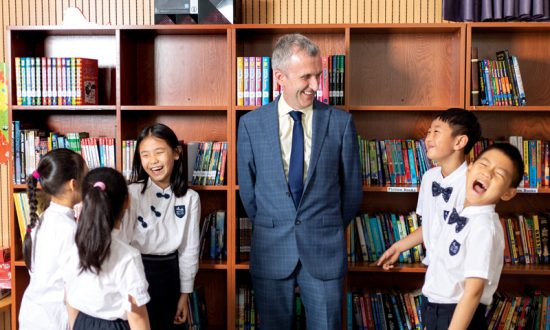An astute international school leader, with a wealth of recent experience in setting up and leading schools in the Middle East and South East Asia, Neil values working with teams that are closely aligned and committed to a shared vision. Neil believes that a happy school is the secret to success. Neil has researched, designed, set up and opened schools using the International Baccalaureate (IB) curriculum in Indonesia, Saudi Arabia and China. Neil is a CIS Accreditation Evaluation Team Leader in the new CIS International Protocol. Neil is currently furthering his vast experience by becoming involved in the growth of interest in international education in China, and by leading the set-up of a new school
One of the IB Learner Profile attributes is balanced. I have written before about how challenging balance is. I don’t think the way so many of us live now encourages living in a balanced way at all.
I believe balance–and the need for awareness about it–remains at the crucial core of the IB. Part of it, and equally important is the current focus on SEL (social emotional learning). Mindfulness and wellbeing are not new concepts, but never has there been a time when wellbeing has been so important in meeting the mental health needs of users and sharers in the social media age.
How do we address our social and emotional needs?
There is no doubt that many of us are ‘out of kilter’ in how we spend our time. We live rather like a drug addict with a craving for instant gratification. The lifestyles that we crave are tantalizing out of touch–because they are often imagery–and we are never satisfied–frustrated in our search for what others have: a better life, more delicious food, more chic clothes and a more beautiful body. Our lives are urgent, unsatisfying and intense with little time for reflection, and instead a demand for immediate results.
Bringing this back to education, how are we going to get the learners in our classrooms to have more purpose in their lives? How will we help them make better use of their recreational time? How are we going to model to them examples of worthwhile and fulfilling hobbies and pursuits for all that future spare time?
In a few years people won’t have to drive their own cars. This will free up a great deal of time for something else. What will people do with that time? Much is said about the nature of 21st century jobs and the fact young people need to be prepared for more ‘free time’ in the future and less working hours, but the irony is having created that situation the learners in our classrooms might not know what to do with it.
Social emotional physical mental and spiritual needs come from a whole variety of sources. I completely get that. I also understand people satisfy those needs in different ways. The social part comes in different ways nowadays through sharing online–as I am doing with this post–expecting response and interaction both with real friends, virtual friends or contacts, or with online strangers.
I also understand that it is crucial to tackle the issues around mental health and the correlation with smart phone use. I am not championing the idea that phones should be banned in schools, but I am of the opinion that we all have a great deal of learning to do before we can even think of advising our learners regarding how to make our lives fulfilling and meaningful. I am fascinated by how people spend their time and hearing about the wide variety of interesting ways people live with purpose.
When I visit, or live, in other countries I am always fascinated by how people give meaning to their lives, a sense of fulfilment and happiness and hope. In Australia, for example, I see a great deal of outdoorsy activities and exercise going on. I think these activities play a vital role in maintaining our physical and mental health, but you don’t need to do an iron man to achieve this and it doesn’t need to be competitive. While individual targets and exercise are good, seeing people taking a walk and talk together is also very heartening. There is no doubt of the vital role of remaining able to communicate and understanding the art of good conversation. Whether its through individual pursuits that demand time alone such as meditation, painting or reading, or whether it’s through social activities, such as team spirits, all are to be encouraged–I suggest both are important–as is to be more mindful of how we are living right now.
There is a variety of extreme opinion about Tiger Woods and I am not an expert on golf. But I have to say I was gripped by the drama–what I did admire was his single–minded sense of purpose: his ability to come back from the dead. He was written off and he was in last chance saloon–maybe even beyond that. Woods had mental and physical health issues–his life was out of kilter but incredibly he got his balance back. Woods’ comeback was an inspiration to older people in sport and on a wider scale to the case for mindset: Tiger won the mental battle. I am convinced he won because of his mentality. Why else could it be? It is improbable that someone of his age and after so many back operations can be a champion athlete again. He won because he got back his winning mentality and his desire and that drove him to victory against all odds.






